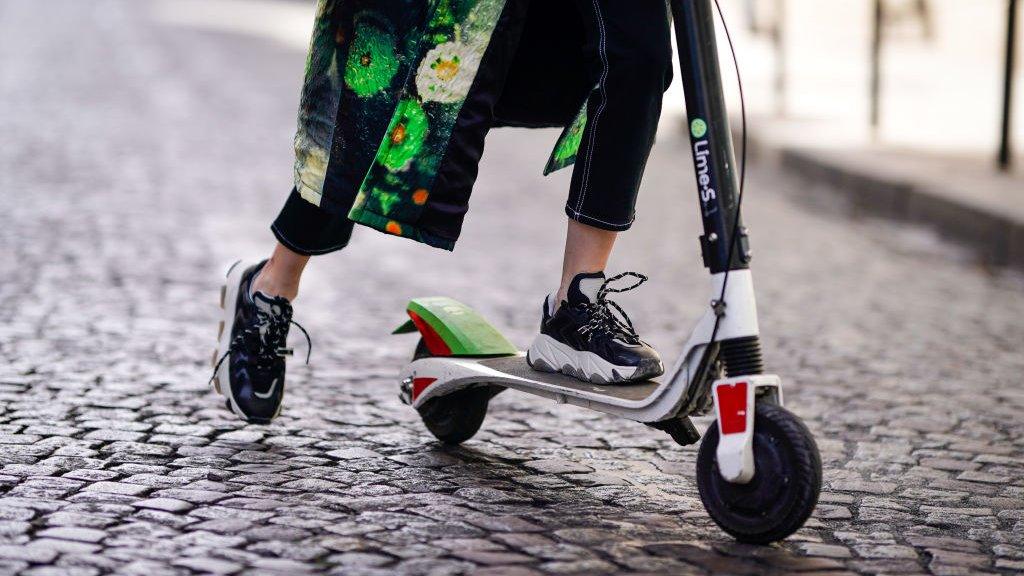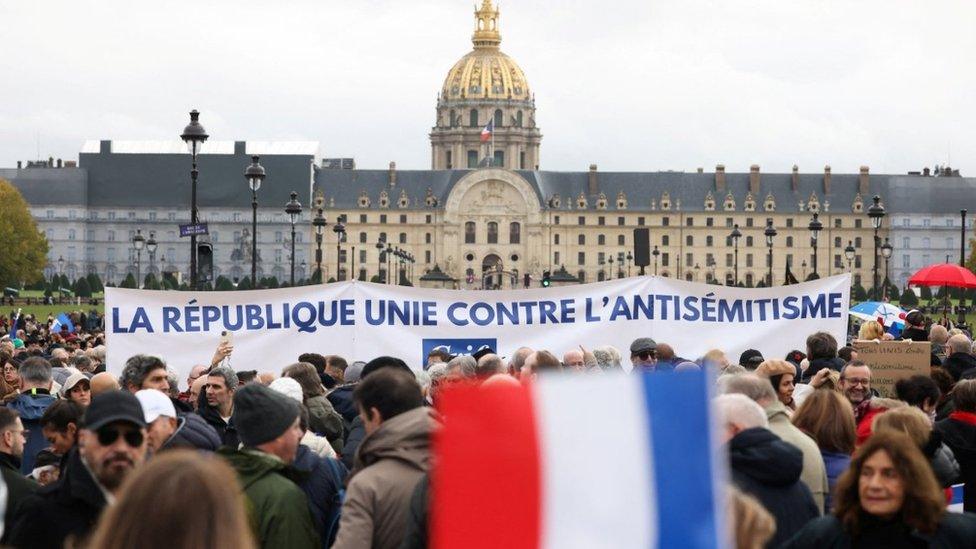Paris Mayor Hidalgo trains sights on SUVs after e-scooter rental ban
- Published

The mayor of Paris is likely to win the vote on SUVs but opponents say she is just trying to deflect attention
Flush from this year's victory over banning rental electric scooters, Paris Mayor Anne Hidalgo has a new on-street target in her sights: SUVs.
Bidding for a place in history as the woman who made Paris green, she has promised another city referendum.
The vote next February will be on whether to increase parking fees for so-called sports utility vehicles.
If last April's e-scooter referendum is anything to go by, the mayor should be confident of another easy victory.
On that occasion only a fraction of the electorate turned out, and they were in their vast majority people who actively hated e-scooters.
For SUVs, Ms Hidalgo has promised that residents of Paris proper will not be affected. In any case, ownership of SUVs - and of cars in general - is relatively low inside the capital's 20 arrondissements or districts. So opposition will be minimal.
Rather, the people most inconvenienced by higher parking fees are suburbanites who drive SUVs into Paris for work or pleasure. Handily, they won't be voting.
The 64-year-old Socialist had been promising a new initiative to build on the e-scooter ban.
But the timing has raised suspicions that she's using it to divert attention from her own SUV - as in Startlingly Unnecessary Voyage.
Opposition council members in Paris City Hall scent blood over a two-week trip taken by Anne Hidalgo to New Caledonia and French Polynesia in the South Pacific in October.
The first half of the visit was supposedly on official business, but from 21 October she stayed on in order to visit her daughter living on the Polynesian island of Raiatea.
It did not help that her absence coincided with the aftermath of the 7 October attacks in Israel, when back in Paris there were serious worries about the Middle East conflict spilling on to the streets.
The mayor's office has issued a strongly worded denial that there was anything untoward about the trip. It says that extending official visits for personal reasons is an accepted practice, and that Ms Hidalgo paid for the second part of her sojourn as well as the return air-fare.
Officially the aim of the visit was first to pay respects at a cemetery in New Caledonia, where deportees from the Paris 1871 commune are buried. The cemetery is paid for by the city of Paris.
Then in French Polynesia the mayor and her party held a number of meetings with local elected officials, before viewing the famous surf spot at Teahupo'o which will be used in next year's Paris Olympics.
Except that that culminating moment of the visit never took place, because of local protests over the environmental cost of a new Olympic viewing platform.
Back in Paris, the reaction from right-wing members of the Paris Assembly has been anything but pacific.
"I'll give you savings - €60,000 of savings," said right-wing councillor David Alphand in a debate Tuesday on the city's heavily indebted budget. The mayor's visit cost just under €60,000 (£52,300).
"Who can honestly say that this trip to the other end of the world was in any way appropriate? Only Madame Hidalgo herself cannot see there is a problem."
For the opposition, there was no justification for Ms Hidalgo going to see the Olympic site, because the minister of sport and the head of the Olympics committee - people who are far more involved in actually organising the Games - had already been there.
The environmental cost of the trip did not go unnoticed either.
"There's something seriously indecent about pointing the finger at a nurse or a builder who has to use their car to come into Paris, when at the same time you're explaining how it was absolutely essential to fly 30,000km in an airplane," said opposition councillor Nelly Garnier.
- Published3 April 2023

- Published12 November 2023

- Attribution
- Published8 November 2023
